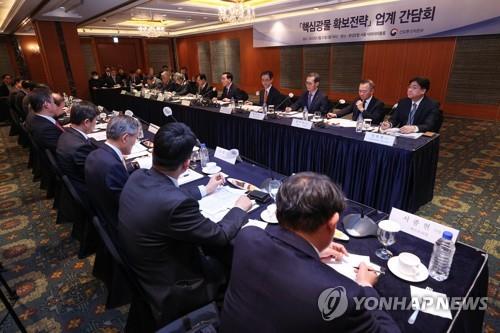- California Assembly OKs highest minimum wage in nation
- S. Korea unveils first graphic cigarette warnings
- US joins with South Korea, Japan in bid to deter North Korea
- LPGA golfer Chun In-gee finally back in action
- S. Korea won’t be top seed in final World Cup qualification round
- US men’s soccer misses 2nd straight Olympics
- US back on track in qualifying with 4-0 win over Guatemala
- High-intensity workout injuries spawn cottage industry
- CDC expands range of Zika mosquitoes into parts of Northeast
- Who knew? ‘The Walking Dead’ is helping families connect
S. Korea seeks to cut key minerals dependence on China to 50 pct by 2030
South Korea seeks to reduce its reliance on China for key minerals, such as lithium and nickel, to 50 percent by 2030 from the current 80 percent by designating 10 “strategic” minerals for intense management of their supplies and strengthening ties with resource-rich nations, the industry ministry said Monday.
They are part of the government’s comprehensive measures to ensure stable supply chains of key minerals and to better secure national economic security, particularly as the U.S. Inflation Reduction Act (IRA) requires electric vehicles’ batteries to be made with higher portions of minerals processed or mined in the U.S or elsewhere that have free trade pacts with the country.
South Korea imports nearly 95 percent of its major minerals, with the proportion of imports from China for lithium hydroxide and cobalt hydroxide coming to 84 percent and 69 percent, respectively.
Their demand has surged recently from such advanced industry sectors as semiconductors and secondary batteries, and it is expected to quadruple in around 2040 compared with 2020 in line with the global push to achieve net-zero goals, government data showed.

According to the measures, the government designated 33 key minerals and selected 10 of them as strategic key items that will come under beefed-up monitoring and supply management. The 10 items are lithium, nickel, cobalt, manganese, graphite and five kinds of rare earths, according to the ministry.
South Korea will seek to deepen cooperation with 30 resource-rich nations to diversify its supply channels of the major minerals. It also vowed to maximize the United States-led Minerals Security Partnership (MSP) framework to help domestic firms advance into foreign nations for key mineral development projects.
The MSP initiative was launched last year and involves 12 nations, including Australia, Canada, France and resource-rich African countries.
The Seoul government also vowed to take the lead in pushing for high-risk overseas resource development projects, while enhancing tax incentives and other financial supports for private firms in their overseas exploration work.
It will develop a global supply map of those minerals and establish an early warning system to figure out supply risks in advance.
To better respond to a possible supply crisis, the government will boost the stockpile of key materials to 100 days from the current 54 days and will introduce a “swift release scheme” to support companies in need of key materials within eight days.
The government will enhance cooperation with private firms to recycle waste resources with a goal of raising the proportion of reused minerals to 20 percent from the current 2 percent, the ministry said.
The measures were announced during a meeting attended by Industry Minister Lee Chang-yang and chiefs of major companies in battery, auto and other related fields, including LG Energy Solution Ltd., Samsung SDI Co., SK On Co., Hyundai Motor Co., and POSCO Holdings Inc. in Seoul on Monday.
“Securing supplies of key minerals in a stable manner is one of the key tasks for us to boost industry competitiveness amid a heated global competition,” Lee said.
“By implementing the strategies, the country will be able to reduce our dependence on key minerals from specific nations from the current 80 percent to around 50 percent by 2030.”











